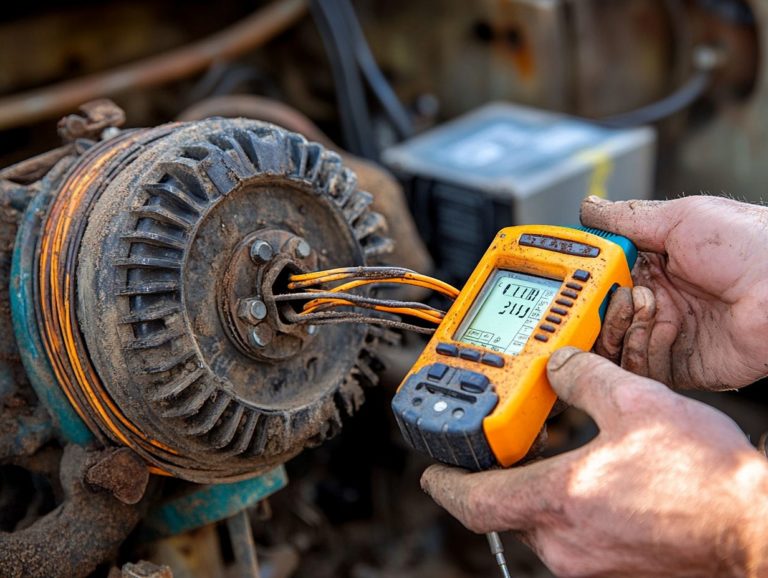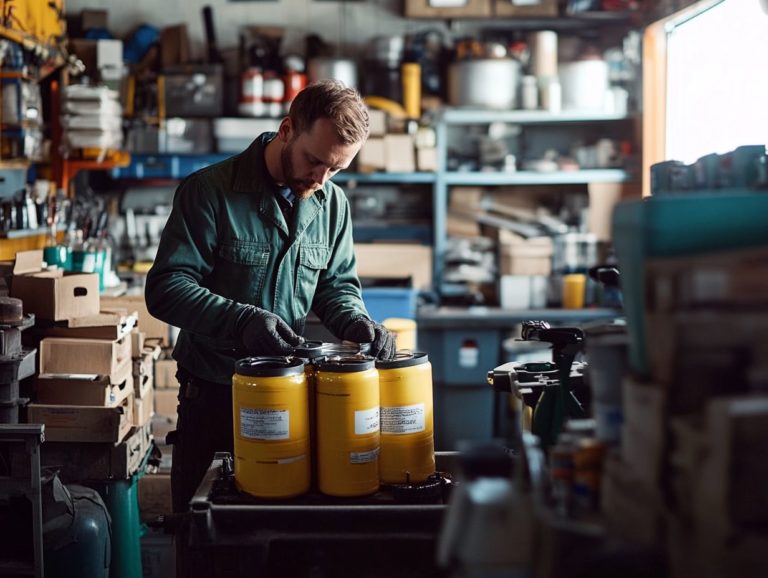How to Handle Noisy Brakes?
Noisy brakes can be more than just a nuisance; they often hint at underlying issues that could jeopardize your vehicle’s safety. Common causes of brake noise encompass various sounds that may serve as indicators of your vehicle’s overall health.
This guide presents DIY solutions for minor concerns, offers insights on when it s best to consult a professional, and shares maintenance tips to ensure your brakes operate smoothly and quietly. You ll uncover best practices to prevent noise from arising in the first place. Your brakes shouldn t merely function; they should do so in silence.
Contents
- Key Takeaways:
- Understanding Noisy Brakes
- Addressing Noisy Brakes
- Maintaining Quiet Brakes
- Preventing Noisy Brakes
- Frequently Asked Questions
- How to Handle Noisy Brakes?
- What are the most common causes of noisy brakes?
- How can I tell if my brakes are making noise because of worn brake pads?
- Can noisy brakes be dangerous?
- Is it safe to continue driving with noisy brakes?
- How can I prevent my brakes from making noise?
- Do I need to replace my brakes if they are making noise?
Key Takeaways:
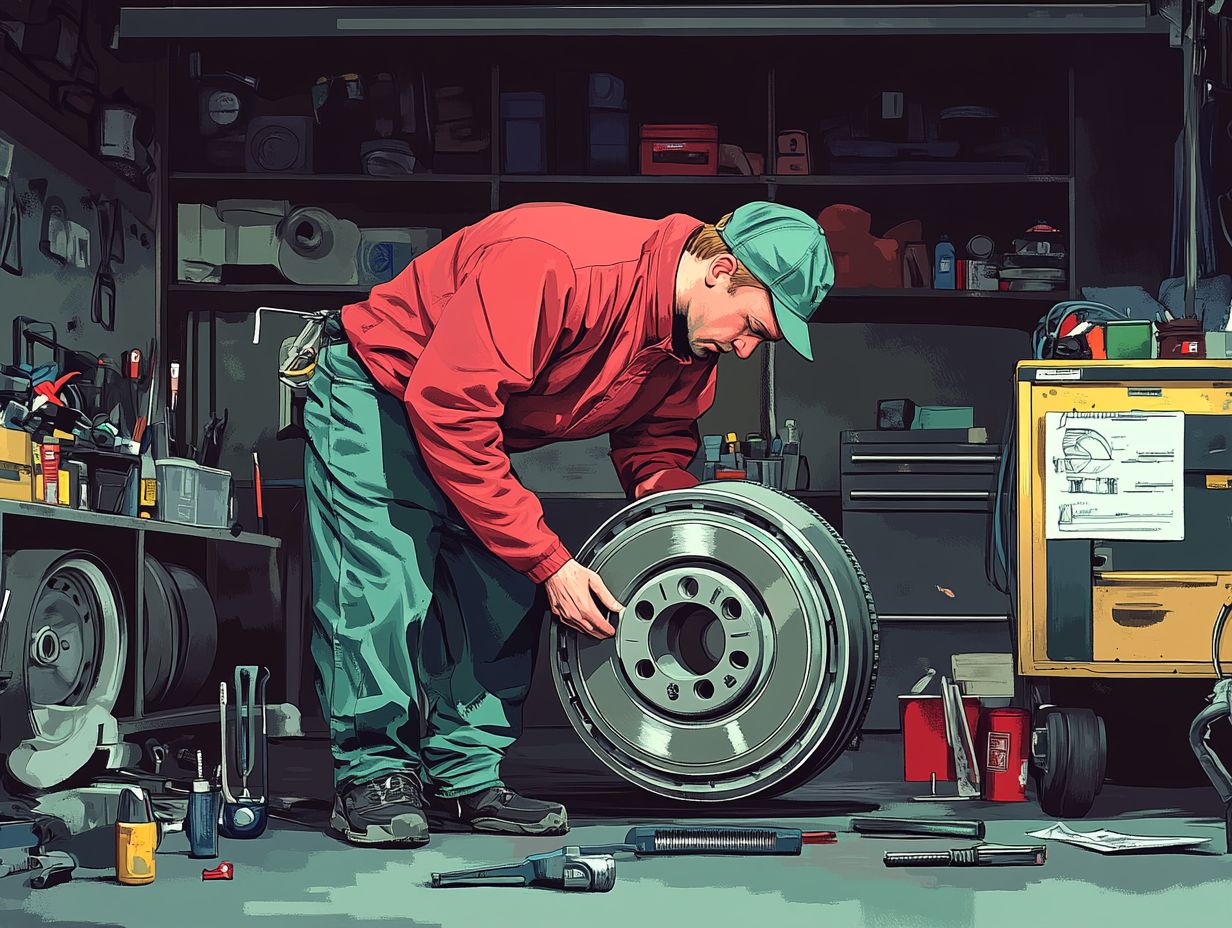
- Regular maintenance is key to preventing noisy brakes. Make sure to regularly check and replace worn brake components to avoid potential noise issues.
- If you hear unusual noises from your brakes, it’s important to address the issue promptly. Ignoring the problem can lead to further damage and potentially costly repairs.
- In some cases, noisy brakes may require professional help. Don’t hesitate to seek assistance from a certified mechanic if you’re unsure about how to handle the issue on your own.
Understanding Noisy Brakes
Understanding the reasons behind noisy brakes is crucial for you as a car owner. Not only does it impact your vehicle s performance, but it also signals potential underlying issues within the brake system that may require your attention.
Noisy brakes can arise from several factors, such as worn-out brake pads, malfunctioning brake rotors, or improper installation. These issues can result in a range of unsettling sounds like squealing or grinding.
It s essential for you to identify and address these noises promptly. This ensures the safety and reliability of your vehicle s braking system.
Common Causes of Noisy Brakes
Common culprits behind noisy brakes often include worn brake pads, damaged brake rotors, or the regrettable choice of inexpensive aftermarket pads that simply don t meet quality standards.
Over time, your brake pads will inevitably wear down due to friction. This can lead to that dreaded metal-on-metal contact, resulting in unpleasant sounds you wish you could ignore.
If your rotors have warped or developed an uneven surface, they only add to that irritating noise. This makes your driving experience less enjoyable.
Choosing low-quality components might seem budget-friendly, but it often backfires, leading to diminished braking efficiency and potentially more extensive damage down the line.
Signs that it s time for a replacement include:
- A squeaking or grinding sound Take immediate action!
- A pulsating brake pedal Take immediate action!
- A noticeable decrease in braking responsiveness Take immediate action!
All of these are clear indicators that you need to take immediate action to ensure your safety on the road.
Types of Noises and What They Mean
Understanding the various noises your brakes make can offer invaluable insight into the health of your braking system. For example, if you hear a high-pitched squeal, it often signals that your brake pads are wearing thin and may need replacement.
This sound typically means that the brake material has worn down enough for a metal wear indicator to come into contact with the rotor.
On the flip side, a grinding noise usually indicates that your brake pads have completely worn out, allowing metal to scrape against metal. This can cause significant damage to your rotors if it isn’t addressed quickly.
If you hear a rattling noise, it could point to loose components like calipers or hardware. This could lead to even more problems if they aren’t tightened or replaced.
To tackle these noises head-on, consider using anti-squeal compounds during installation. This can help minimize friction and vibration, extending the lifespan of your braking system while ensuring you enjoy a quieter ride.
Addressing Noisy Brakes
Addressing noisy brakes is essential for ensuring both the optimal performance and safety of your vehicle. Depending on the severity of the issue, effective solutions can range from straightforward DIY fixes to professional interventions.
Regular brake maintenance is vital to prevent noise problems. Inspect critical components like brake pads and rotors regularly. By pinpointing the right brake squeal solutions such as replacing worn pads or cleaning rotors you can significantly enhance the efficiency and longevity of your braking system.
DIY Solutions
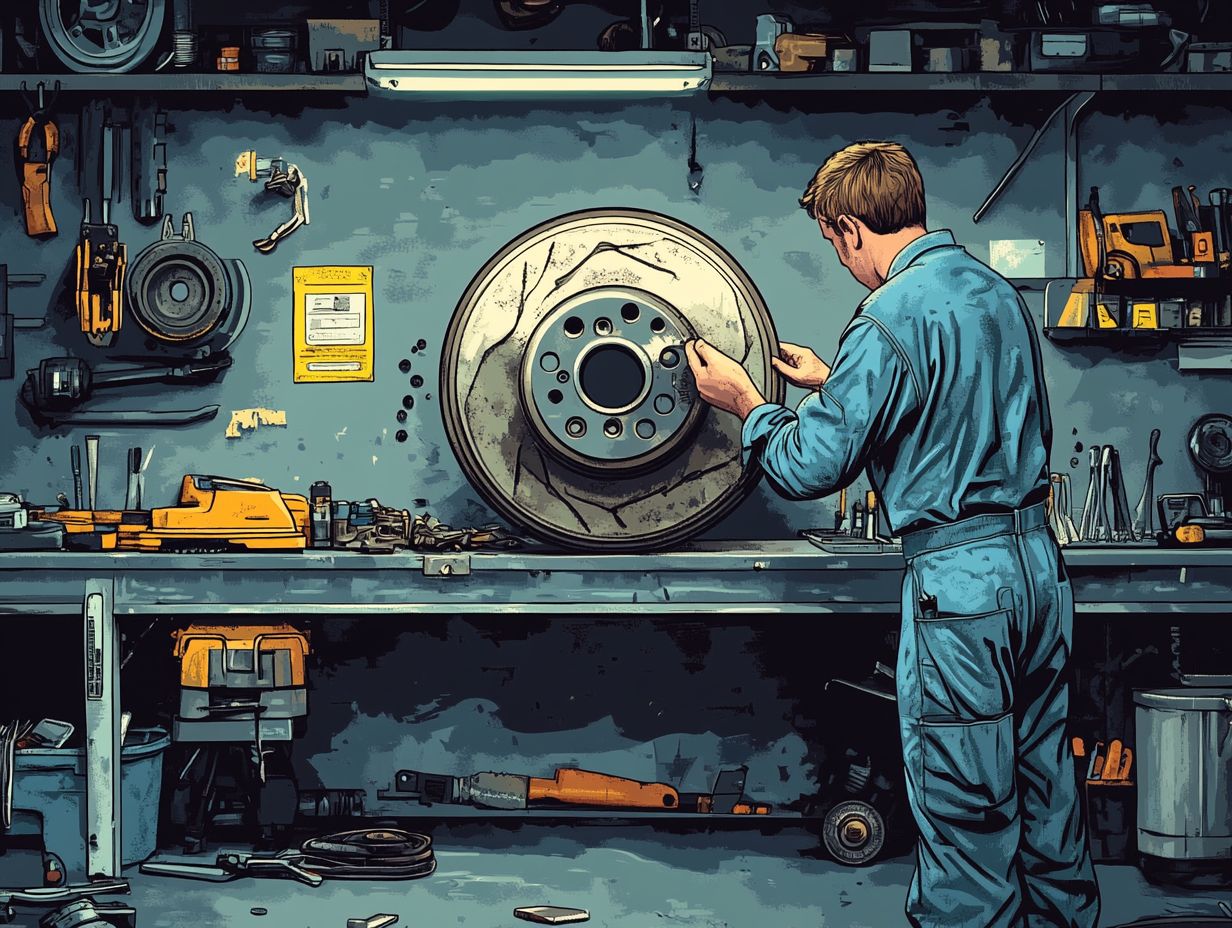
Many car owners can effectively address noisy brakes with a few DIY solutions, such as cleaning rotors and replacing worn brake pads. Always observe proper installation precautions to ensure both safety and effectiveness.
Start tackling brake noise by following these steps:
First, gather the necessary tools: a jack, jack stands, a wrench set, and brake cleaner. Safely lift the vehicle and remove the wheel to access the braking components. Inspect the rotors for any debris or surface rust, as contaminants can amplify noise.
Next, use brake cleaner to thoroughly spray the rotors and wipe them down with a clean cloth. If the brake pads are worn, replace them. Remove the caliper, unmount the existing pads, and install new ones, ensuring they fit securely. Adhere to all installation guidelines to avoid safety issues from improper handling.
When to Seek Professional Help
While you might tackle many brake issues on your own, sometimes reaching out for professional assistance is the best choice especially if you notice significant wear or persistent performance problems.
If you hear grinding noises, experience an unusually soft brake pedal, or feel a pulsating sensation when stopping, these are serious warning signs you can’t ignore! They indicate deeper issues that could escalate into safety concerns. Severe brake performance problems often need a technician’s expertise to pinpoint the root cause.
A skilled mechanic can ensure every component, from the pads to the rotors, operates correctly. Investing in regular professional brake maintenance not only bolsters your safety but also extends the lifespan of your braking system, protecting both your vehicle and everyone inside it.
Maintaining Quiet Brakes
Maintaining quiet brakes is an ongoing journey that requires regular brake maintenance, a keen understanding of brake pad characteristics, and long-term solutions that enhance performance.
Opting for high-quality components, like NAPA premium brake pads or PBR, can significantly reduce noise issues and extend the lifespan of your braking system.
Knowing how to care for aftermarket pads improves your brakes’ performance and ensures a smoother and quieter ride.
Regular Maintenance Tips
Keep an eye out for brake dust! Regular checks can save you from bigger issues down the road. To ensure quiet and effective braking, monitor brake dust accumulation, clean your rotors, and replace brake pads timely.
These practices are vital for preventing wear and tear that could compromise your safety on the road. Inspect your brake system at least every six months or after long trips. Look out for any unusual sounds or vibrations, as these may signal underlying issues.
Cleaning your rotors is essential; accumulated debris can impair performance and lead to uneven wear. Use a suitable cleaner and a soft brush to remove dust, helping maintain optimal function. Promptly replacing worn pads guarantees better stopping power and extends the lifespan of your entire brake system.
Long-Term Solutions
Implementing long-term solutions for brake maintenance can significantly enhance fade resistance, noise reduction, and overall brake performance. This ensures you enjoy a smoother driving experience.
One effective approach is to incorporate vibration dampers, which absorb sound and reduce annoying squeals from brakes.
Using anti-squeal shims can further minimize noise by acting as padding between brake parts to lessen noise.
Choosing high-quality aftermarket pads not only elevates performance but also extends the lifespan of your braking system. This results in fewer replacements and a quieter ride over time.
These strategies create a comprehensive plan for achieving quiet, efficient braking while prioritizing your vehicle’s safety.
Preventing Noisy Brakes
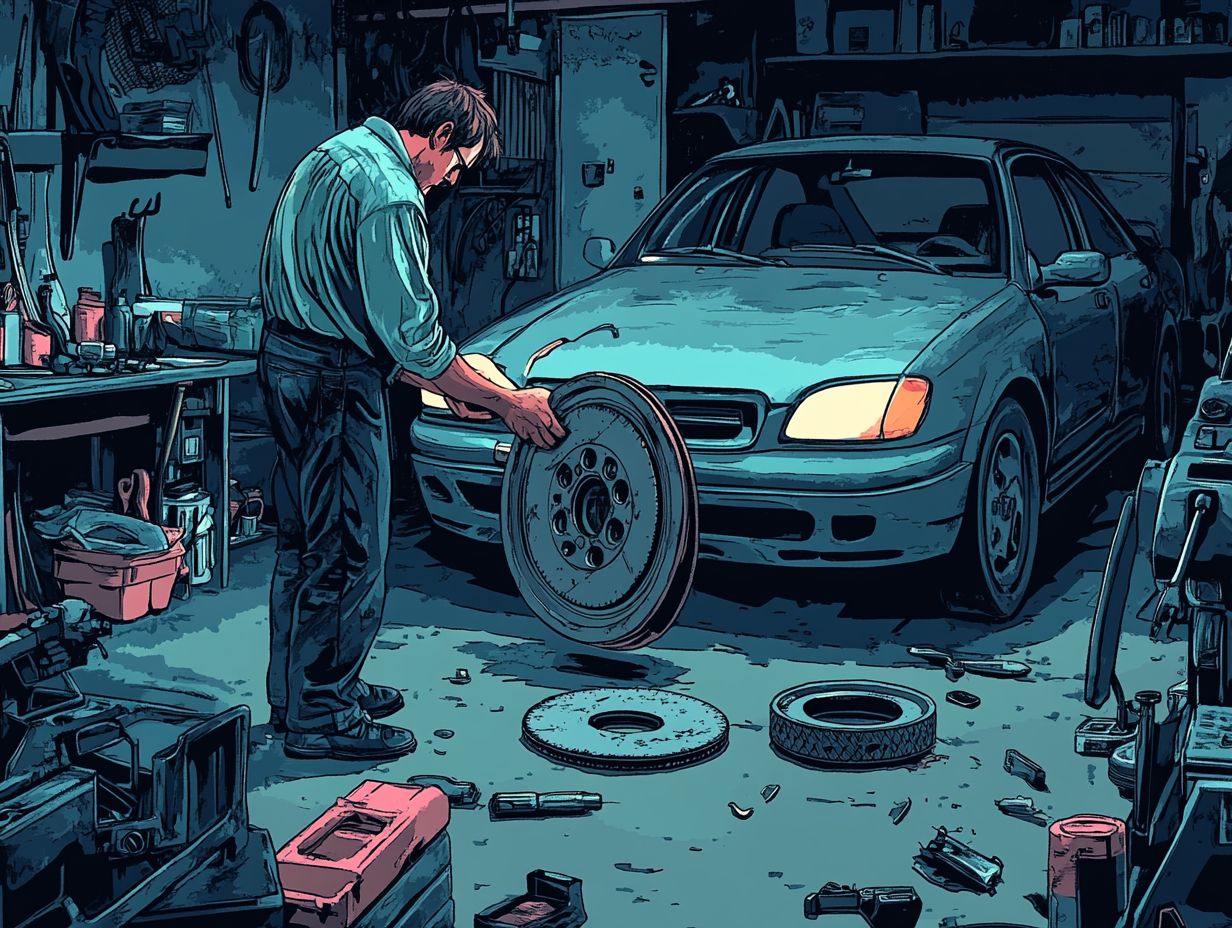
Preventing noisy brakes is essential for your car s health! It involves meticulous brake care, regular maintenance checks, and timely adjustments to ensure optimal brake pressure and performance.
By proactively tackling issues like uneven wear on brake components and machining rotors when needed, you can significantly reduce the likelihood of brake noise. This ensures a smoother and safer driving experience.
Best Practices for Brake Care
Best practices for brake care involve a deep understanding of brake pad characteristics, ensuring proper installation, and regularly cleaning rotors to prevent dust buildup. This ultimately extends the life of your brakes.
Pay attention to the installation process. Adhering to the manufacturer’s guidelines is essential to avoid misalignment that can lead to uneven wear and compromised performance.
Incorporate regular cleaning routines that include inspecting for contaminants like grease or oil, especially if you operate in environments prone to grime.
Monitoring performance through periodic checks of brake response and friction is crucial. This helps identify any developing issues early on, significantly enhancing overall system reliability and safety.
By emphasizing these key aspects, you not only prolong the lifespan of your brake components but also ensure smoother and more efficient operation of your vehicle.
Frequently Asked Questions
How to Handle Noisy Brakes?
Noisy brakes can be a frustrating and sometimes dangerous problem for drivers. Here are some common questions and answers to help you handle noisy brakes.
What are the most common causes of noisy brakes?
There are several potential causes of noisy brakes, including worn brake pads, damaged rotors, or a build-up of debris or rust on the braking system.
How can I tell if my brakes are making noise because of worn brake pads?
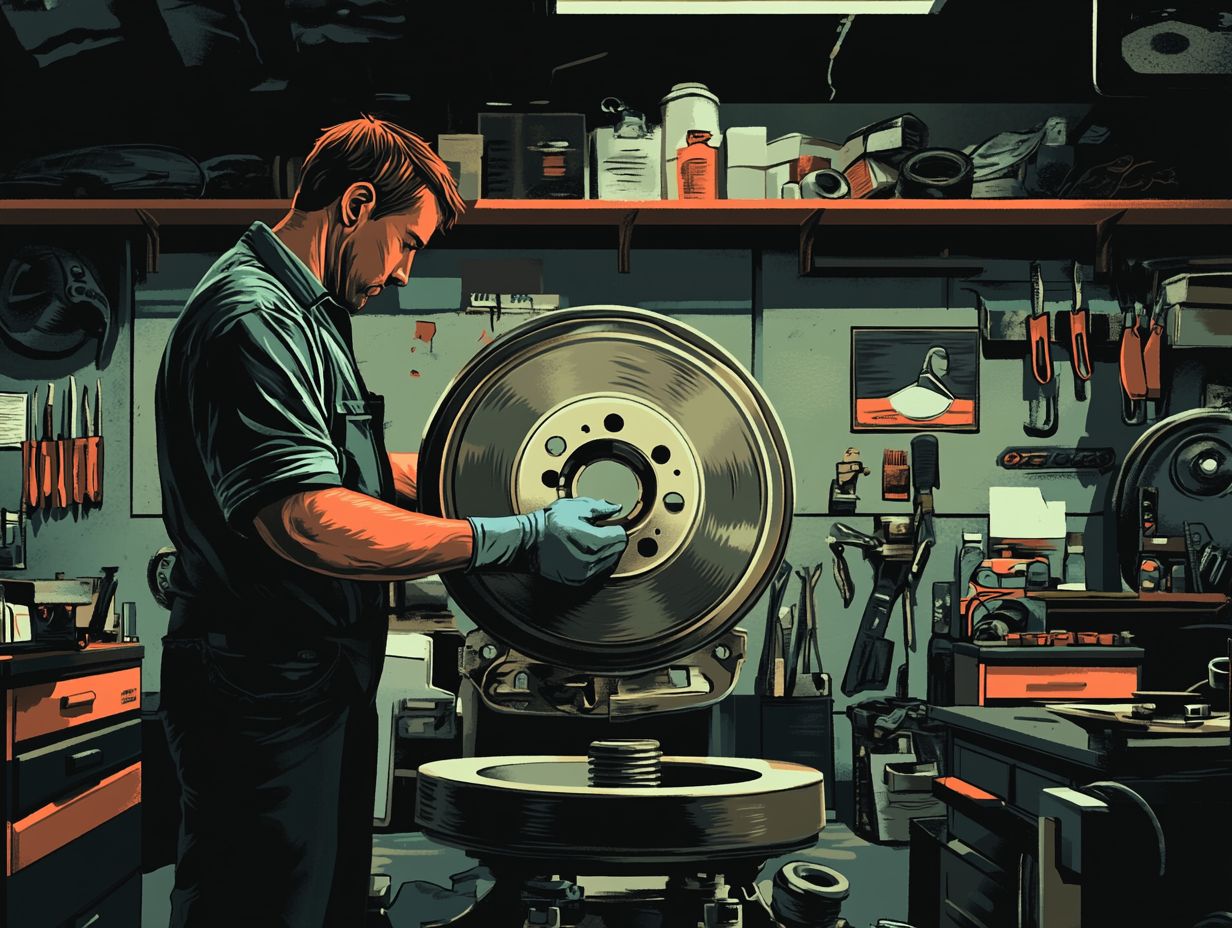
Worn brake pads will often make a high-pitched squealing or grinding sound when the brakes are applied. You may also notice decreased braking performance or vibration in the brake pedal.
Can noisy brakes be dangerous?
Yes, noisy brakes can be a sign of a more serious problem and should be addressed as soon as possible. In some cases, the noise can also be a distraction for the driver, making it unsafe to focus on the road.
Is it safe to continue driving with noisy brakes?
It is not recommended to continue driving with noisy brakes, as they could potentially fail at any moment. It is best to have your brakes inspected and repaired by a professional as soon as possible.
How can I prevent my brakes from making noise?
Regular maintenance and inspections of your braking system can help prevent noisy brakes. It is also important to avoid harsh braking and to have your brakes serviced at the first sign of noise or decreased performance.
Do I need to replace my brakes if they are making noise?
It depends on the cause of the noise. In some cases, the brakes may simply need to be cleaned or adjusted. However, if the noise is due to worn or damaged brake components, they will likely need to be replaced. It is best to have a professional mechanic diagnose the issue and recommend the appropriate course of action.
Don t wait! Schedule a brake check today to ensure your safety on the road.


